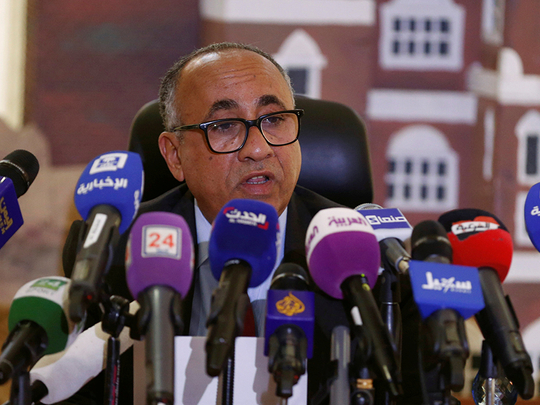
Al Mukalla: The new governor of Yemen’s central bank said on Monday the internationally-recognised government had taken the decision of relocating the monetary authority’s headquarters to Aden after informing international monetary bodies.
Munasar Al Quaiti, a former minister of finance, said in a press conference in the Saudi capital that the government sacked the Sana’a-based central bank chief after they realised he was colluding with Iran-backed Al Houthis by allowing them to plunder billions of Yemeni rials to finance their military efforts.
“The central bank has given them a free hand on the government’s accounts,” he said.
Yemen president Abd Rabbo Mansour on Sunday night replaced Mohammad Bin Humam as central bank chief, and reshuffled the bank’s board.
Hadi also appointed new ministers.
Al Quaiti said Al Houthis have withdrawn 25 billion Yemeni rials (Dh367 million or $100 million) monthly from the central bank since early last year and spent the money on their military expansion across Yemen.
The government’s relationship with Mohammad Bin Humam has soured since August, when prime minister Ahmad Bin Daghar accused him of facilitating Al Houthi plundering of the bank’s reserves.
To stop the rebels from using the country’s reserves overseas, Bin Daghar sent a letter to the International Money Fund and international banks asking them to sever ties with Bin Humam or face legal action.
Bin Humam denies misusing the funds, saying he alerted Bin Daghar’s government about the bank’s transactions.
In Riyadh, Al Quaiti said the cash-strapped Al Houthis, with the help of the central bank in Sana’a, secretly tried to print 400 billion Yemen rials through a Russian banknote-printing company called Goznak.
The company revoked the agreement with Al Houthis after receiving a warning letter from the government.
The bank’s foreign reserves have dropped from $5.2 billion in September 2014, to $700 million by the end of August 2016, according to Al Quaiti.
Mustafa Nasser, the director of Economic Media Centre, said on his Facebook page that the relocation of the central bank would put an end to Al Houthis blackmailing their opponents who live inside liberated territories and would make international transactions with Yemen banks easier.
“Keeping the central bank in Sana’a under the control of Al Houthi authority has limited financial transactions. The government is obliged now to restore confidence of international banking sector,” he said.
The governor of Aden, Aidarous Al Zubidi, visited on Monday the new headquarters of the Yemeni central bank.
Al Zubidi described Hadi’s decree as “bold” and expected Aden to expand its political and economical role.











